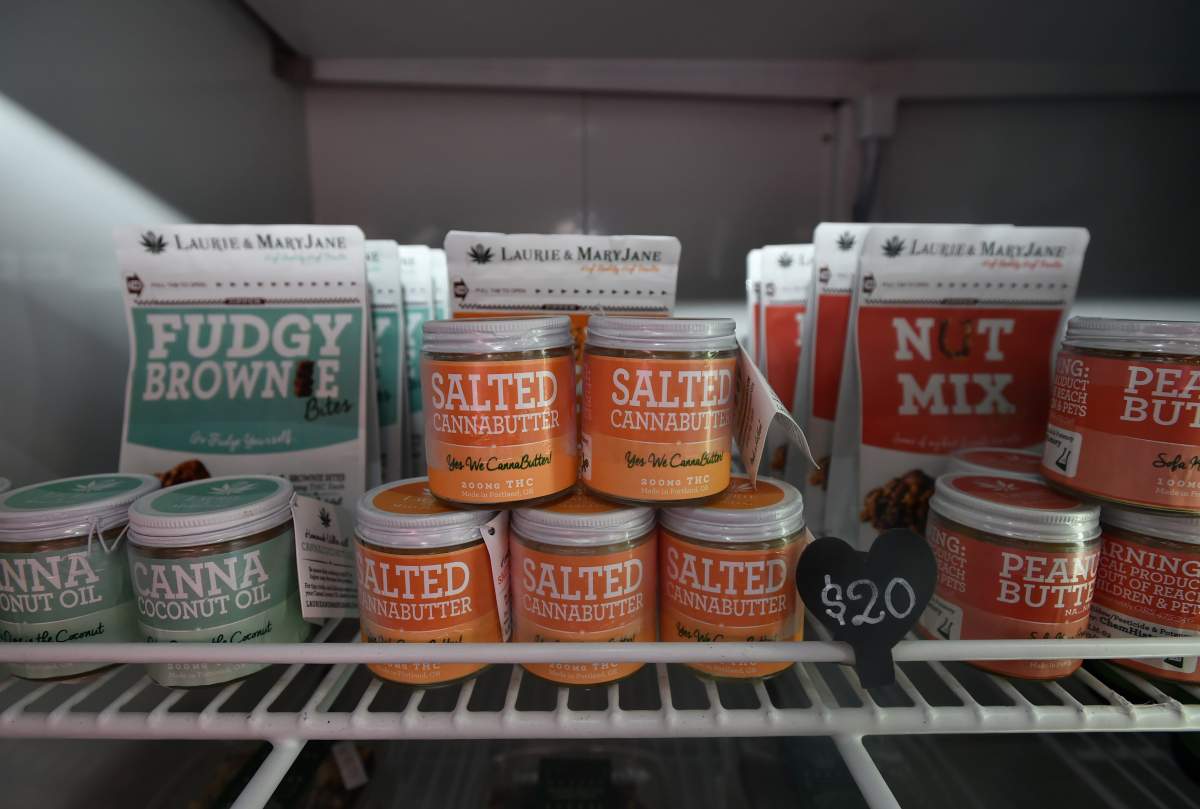About a third of Canadians in a recent poll (34 per cent) say they will at least try smoking marijuana after it becomes legal next summer, as opposed to 12 per cent who smoke pot recreationally now, according to an Ipsos poll conducted on behalf of Global News.

But almost as many, 29 per cent, say they will consume edible marijuana products, up from seven per cent now.
The data implies that about 3.4-million Canadian adults use pot recreationally now, and about 9.6 million will after legalization, at least occasionally.
Younger Canadians are far more likely to say they would try edibles than their elders (18-34: 51 per cent; 35-54: 28 per cent; 55+: 14 per cent).
LISTEN: Ipsos CEO explains results of poll outlining Canadians’ attitudes toward marijuana
And not surprisingly, edibles appealed more to non-smokers.
“The survey showed that smokers are more amenable to the idea of smoking it, though they have an interest in both products,” said Darrell Bricker, CEO of Ipsos Public Affairs, which conducted the poll. “Non-smokers are more interested in edibles. Smoking incidence is declining in Canada.”
WATCH: The NDP are questioning why edible cannabis is not included in the Liberals’ marijuana legislation and are asking them to fix the issue.

Men were more likely to say that they would smoke legal pot (39 per cent) than women (29 per cent). But on edibles, the gender ratio became closer to even, at 32 per cent to 26 per cent.
“There’s a lack of awareness of edibles,” Bricker says.
“When people think about marijuana, they generally think of it as ingested through smoking. But as they become aware of the different options that exist for consuming marijuana, particularly for someone who’s a non-smoker, you might see more interest in edibles.”

Get weekly health news
LISTEN: Newstalk 770’s Rob Breakenridge chats with Dalhousie University’s Dean of Management and Professor of Food Distrubition and Policy
U.S. states that have legalized recreational marijuana have seen a wide variety of edible pot products being sold, from tea to gummy bears to peanut butter. A legal market lends itself to factory production of high-quality consistently dosed edibles.
Whether a legal cannabis retail system can cope, at least at first, with a third of the country showing up and wanting some is a question. “I think you’d better take a number and stand in line,” Bricker says.

What else we learned:
Some Canadians say they would drink less if legal recreational pot was available.
Some seven per cent of respondents said they would drink less alcohol under legalization. (two per cent said they’d drink more.)
Millennials are much more likely to say they would substitute pot for alcohol, at 11 per cent as opposed to five per cent for those 55+.
If it happened that way, it would match experience in Washington and Oregon, where legalization seemed to coincide with a modest decrease in alcohol use.
On the other hand, legalization in Colorado (opposed, when it was being debated, by alcohol-related lobby groups) didn’t seem to affect alcohol sales.
It’s not clear how increased availability of cannabis affects the consumption of other substances. U.S. data seems to show that it helps to reduce use of opiods, may reduce use of alcohol, and may increase use of tobacco, as non-smokers are habituated to smoking through smoking pot. (In the Ipsos poll, eight per cent of respondents said that legal pot would lead them to smoke fewer cigarettes, while two per cent said they would smoke more.)
Consistent numbers of people across income levels said they would substitute pot for alcohol.
Disapproval will linger.
Over a third of respondents (37 per cent) said they would still disapprove of family and friends using marijuana, even after it becomes legal. That’s down from the 45 per cent who say they would disapprove now, under prohibition, but still significant. (21 per cent said they would strongly disapprove, down from 26 per cent now.)
Disapproval of people using legal pot was:
- Highest in Saskatchewan, Manitoba, and Quebec (all 42 per cent)
- Lowest in B.C. (28 per cent)
- Higher with increased education (from 22 per cent among those with less than a high school education up to 44 per cent of university graduates)
- Strongly correlated with age, from 22 per cent disapproval among those 18-34 to 45 per cent for those 55+.
Disapproval in more conservative provinces has implications for how pot is sold there, Bricker says.
“What it shows for those provinces is that they’re going to have to be very, very careful, and they’re going to have to look at mechanisms for controlling consumption and access to marijuana. It’s probably going to be more of a divisive political issue in those places.”

What about people who don’t smoke pot now?
Ipsos asked people who don’t use marijuana now, why. Respondents could pick more than one answer:
- Respect for the current law: 19 per cent
- Concern about getting caught: five per cent
- Not interested: 77 per cent
- Concerns about health: 32 per cent
Interestingly, almost nobody (only two per cent) chose ‘Don’t know who to approach to buy’.
The Ipsos poll was conducted on behalf of Global News between September 15 and 18, 2017 using a sample of 1,001 Canadians from Ipsos’ online panel. Weighting was then employed to balance demographics to ensure that the sample’s composition reflects that of the adult population according to Census data and to provide results intended to approximate the sample universe. In this case, the poll is accurate to within +/ – 3.5 percentage points, 19 times out of 20, had all Canadian adults been polled.









Comments
Want to discuss? Please read our Commenting Policy first.